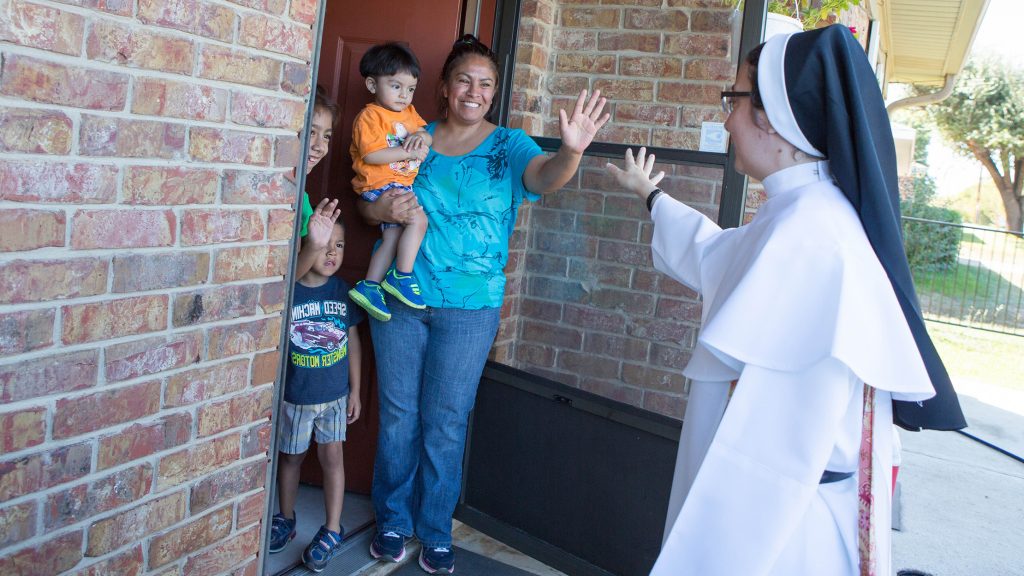After the success of a pair of pilot programs this spring, a nationwide "Sisters on the Frontlines" fundraising effort aims to give 1,000 sisters $1,000 each to help blunt the negative impacts of the coronavirus on some of the United States' most vulnerable people.
The program was unveiled June 22 by Catholic Extension, which will administer the grants. To date, six foundations have formed an alliance to pledge funds -- but not the entire $1 million needed -- to give $1,000 each to 1,000 sisters -- to get the initiative started.
"We're inviting all of the sisters who are on the front lines to make a simple request to participate in the program -- not an application process," said Joe Boland, vice president of mission for Catholic Extension. He added the sisters may serve anywhere, not just the 87 U.S. dioceses in Catholic Extension's territory.
"The thought is, let's get some money into the hands of sisters, and there doesn't need to be an enormous vetting process, because all of the funders who are funding this have a conviction that sisters are trustworthy," Boland told Catholic News Service in a June 23 phone interview.
"If they're engaged in some ministry that is serving the poor -- or have access to the poor -- they determine how the money will be spent," Boland added. "They know the ones in their communities, they know the names, the faces, the families. They will be able to deliver it or organize it in such a way that support goes to those who have the greatest need."
The foundations forming the alliance in partnership with Catholic Extension are the Conrad N. Hilton Fund for Sisters, Foundations and Donors Interested in Catholic Activities, GHR Foundation, Raskob Foundation for Catholic Activities, Sisters of Charity Foundation of Cleveland and Sisters of Mercy of the Americas.
The Sisters of Mercy did one of the pilot programs, said Mercy Sister Deborah Troillett. The nuns who were given grants "spoke of how humbling it was," she told CNS in a June 24 phone interview. "The difficulty was deciding who, because the need was so great. That was a challenge for a number of our younger sisters. You can't do everything. How do you decide when there's so much need?"
Sister Troillett said 85 Mercy sisters were identified in the first round of pilot program grants, with funds being sent as early as Holy Week. Of the $100,000 allotment by the GHR Foundation -- which is good for another $100,000 for the expanded program -- all but $1,000 has been spent, and that last grant is spoken for by a Mercy sister in the Philippines who applied for a second-round grant.
In northeast Ohio, the Sisters of Charity Foundation of Cleveland allotted $61,000 to be distributed by the 10 religious orders with motherhouses in the Dioceses of Cleveland and Youngstown, according to Margaret Eigsti, the foundation's project manager.
"One of the negative impacts (of COVID-19) has been the financial impact, the economic one. People losing jobs and therefore income. Those people who were already suffering, living in poverty, have been impacted that much more than they were before," Eigsti said.
"With the increasing need -- some people may never have gone to food pantries before -- it's put a strain on the social service system all around. There are people who are falling through the cracks and are not getting the support that they need. What is wonderful about these sisters, who have trusted relationships with individuals through their ministries, people who may not be able to access the system, transportation or knowledge of what's out there can get help."
Sister Troillett said the Mercy sisters spent their grant money on "everything from what you would imagine -- food, medicine. Sadly, in one way we were able to help with funeral expenses. There were simple things like somebody didn't have enough money to repair their car so they could get to work, so it was a car repair bill. It was rent. It was utilities. In the Philippines, in Peru, the sisters sent me very dramatic pictures of just taking food to the rural country side, just delivering these bags of food -- these very basic staples of rice and beans."
Kathleen Mahoney, a senior program officer for the GHR Foundation, said the concept developed while in conversations with the Mercy Sisters' leadership team. "We came up with this idea, the GHR board approved this and said, 'Let's try it!'" Mahoney said.
From the pilot program, she said, the nuns did "just a beautiful job in using those smaller grants," she added, each sister sending along "very touching stories about how they supported people in need."
The foundation has an extensive portfolio of charitable works both domestically and internationally, according to Mahoney, but through it all runs "a long and deep regard for Catholic sisters. We have a high regard for the life and ministry of Catholic sisters."
Alexia Kelley, president and CEO of Foundations and Donors Interested in Catholic Activities, said $200,000 has been committed by the participating foundations thus far. Donations can be made online at https://give.catholicextension.org/page/20195/donate/1.
"A key part of FADICA's mission is to support collaborative efforts of member foundations and funders. Members’ collaborative work is often more intensive during a crisis such as this pandemic, and members have also funded collaboratively in the wake of Hurricane Katrina and the Ebola crisis, for example," Kelley told CNS in a June 24 email.
"However, members also collaborate on a regular basis, informally and formally through our member working groups," she added, on such issues as Catholic schools, anti-trafficking and church vitality.
Catholic Extension, which is based in Chicago, supports the work and ministries of U.S. mission dioceses. It raises and distributes funds to support these dioceses, many of which are rural, cover a large geographic area, and have limited personnel and pastoral resources.

